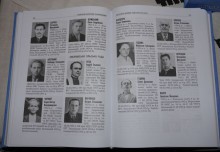A book of memory Juvenile Political Prisoners of Ternopil region came out in Ternopil. The publication includes memories of the underground members of OUN, UPA, and the people who were born within the prison walls. The book consists of three chapters. The first part includes short biographies and photographs of young political prisoners; it is divided into 17 smaller units, representing every raion of Ternopil oblast separately. The second section includes memories, articles, and poems by political prisoners, as well as information about youth patriotic underground organizations of Pidvolochysk and Chortkiv raions in 1945-51 and 1973. The third section contains documents about Soviet government, methods of interrogation, a map of the USSR camps, and the information on how the prisoners were held. The book also includes modern pictures on the activity of the Ternopil regional organization of the Ukrainian Society of Political Prisoners and Repressed. Ihor Oleshchuk has been the editor and compiler of the book. The editorial collective also includes Volodymyr Birchak, Demian Chernets, Mykhailo Bakanchuk, and Petro Holyk.
“Based on the available documents we have created biographies of over 2,500 young prisoners. Among those sentenced for longer terms there were 15 prisoners at the age of 14 and 50 – at the age of 15; 400 of the sentenced were 17-year-olds, and about 400 were soldiers of OUN and UPA, of which 237 were tortured to death or executed in prisons and camps. Many prisoners were shot in 1941, and later – in 1944; when the Bolshevik occupation came back, many were shot in their own backyard... We have gathered data mainly on those young prisoners who belonged to youth organizations. It was very difficult to assemble the photographs of political prisoners,” says Ihor Oleshchuk, the book of memory compiler and a senior researcher at the Historical and Memorial Museum of Political Prisoners.
The juvenile political prisoners, whose life stories are presented in the book, are now 80-90 years old. For a complete study of our history Ihor Oleshchuk considers it necessary to establish local branches of the Ukrainian Institute of National Memory.







